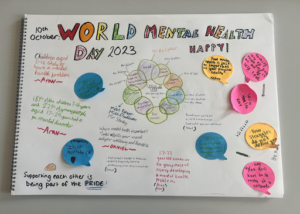World Mental Health Day
 On Tuesday, October 10th, we observed World Mental Health Awareness Day. It provided an opportunity for us to engage with our pupils about the concept of mental health, how to nurture it, and where they can seek assistance if needed.
On Tuesday, October 10th, we observed World Mental Health Awareness Day. It provided an opportunity for us to engage with our pupils about the concept of mental health, how to nurture it, and where they can seek assistance if needed.
During the morning form time, pupils concentrated on the ‘Circle of Care’ posters that can be found in every classroom at School, ensuring they know precisely where to turn when necessary. Additionally, the year 8 pupils discussed their responsibility in looking out for younger pupils and have been considered as an additional ‘circle’ on the chart.
The recognition of this day also extended into the students’ main lessons, including:
- Music and performing arts lessons, which involved discussions on stage fright and performance anxiety.
- Language lessons, which revisited ways for individuals to express their emotions.
- Maths lessons, which paid tribute to the life of Alan Turing through various code-breaking tasks.
- Sport lessons, which focused on the connections between physical exercise and mental health.
- Science lessons, which explored how chemical changes in the brain can impact one’s mental health.
- D&T lessons, discussing how shapes are helpful for creating user-centred designs/everyday products, buildings and structures.
Please read more about some of these lessons below:
Design & Technology
The concept of utilising shapes for user-centred designs and everyday products plays a pivotal role in D&T. Different shapes evoke varied emotional responses, impacting how individuals perceive and interact with their surroundings. For instance, curved and organic shapes are often associated with calmness and tranquillity, which can be incorporated into the architecture of spaces to create soothing environments, enhancing mental peace. Angular shapes, on the other hand, can convey a sense of stability and order, providing reassurance and security. By understanding the psychological implications of shapes, designers can create everyday products, buildings, and structures that contribute to a positive mental state for users, fostering a world where thoughtful design becomes an ally in mental health support.
Languages
ut valēs? Ça va ?¿Cómo estás?
This week in Latin, French, and Spanish lessons, pupils have been revisiting the ways they express their emotions to one another. They have discovered shared linguistic roots in the adjectives they use, like “contentus” (Latin), “content” (French), and “contento” (Spanish). Pupils across the school engaged in discussions about how the simple gesture of asking “how are you?” plays a crucial role in human interaction, emotional support, and the maintenance of positive relationships.









